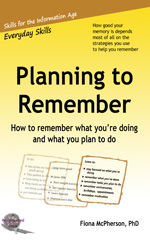- Short-term memory problems are, by and large, attention problems.
- Attention involves both the ability to keep focused on the information you want to keep active, and the ability to not be distracted by competing and irrelevant stimuli.
- You need to actively attend to keep information active, particularly as you get older.
- Many of us over-estimate how much information we can keep active at one time.
Many people, particularly as they get older, have concerns about short-term memory problems: going to another room to do something and then forgetting why you’re there; deciding to do something, becoming distracted by another task, and then forgetting the original intention; uncertainty about whether you have just performed a routine task; forgetting things you’ve said or done seconds after having said or done them; thinking of something you want to say during a conversation, then forgetting what it was by the time it’s your turn to speak, and so on.
This is clearly an issue for many of us. Part of the reason, I believe, is simply that we expect too much from ourselves. For example, research has shown that even a very, very short delay between recalling an intention and being able to carry it out is sufficient to dramatically reduce the likelihood that you will remember to do the intended action — we are talking about a delay of only 10 seconds!
The problem is exacerbated by age (I’m not talking about advanced age — I’m afraid certain aspects of cognitive processing begin to decline as early as the 30s).
Part of the problem is also that we tend to believe that we don’t need to do anything to maintain a thought, particularly when it has “popped” into our minds easily. But current estimates are that unrehearsed information lingers in working memory for less than two seconds!
Some of these problems are dealt with in my article on action slips (these problems are not, strictly speaking, a failure of memory, but a failure in attention), and in my book on Remembering intentions.
But in this article I want to talk about another aspect: the relationship between working memory, and attention (and, as it happens, intelligence!).
In my article on working memory and intelligence I talk about the difference between crystallized and fluid intelligence — that fluid intelligence is probably a better measure of what we think of as “intelligence”, and that working memory capacity is often used synonymously with fluid intelligence. A new theory is that the relationship between working memory and fluid intelligence is due to the ability to control attention.
This theory emphasizes the role of attention in keeping information active (i.e. in working memory), and argues that working memory capacity is not, as usually thought, about the number of items or amount of information that can be held at one time. Instead, it reflects the extent to which a person can control attention, particularly in situations where there is competing information / demands.
I have to say that this makes an awful lot of sense to me. I can’t, in the space I have here, go into all the evidence for and against the theory, but here’s one situation which is interesting. The “cocktail party phenomenon” is a well-known method in psychology, whereby people are given two streams of audio, one for each ear, and instructed to listen only to one. At some point, the person’s name is spoken into the unattended stream, and about a third of people pick that up. In a recent take of that classic study, researchers compared the performance of people as a function of their working memory capacity. Only 20% of those with a high capacity heard their name in the unattended channel compared to 65% of low-capacity people. The point being that a critical aspect of good attentional control is the ability to block our irrelevant information.
This ability is one that we already know is worsened by increasing age.
The message from all this, I guess, is that:
- short-term memory problems are, by and large, attention problems.
- attention involves both the ability to keep focused on the information you want to keep active, and the ability to not be distracted by competing and irrelevant stimuli.
- you need to actively attend to keep information active, particularly as you get older.
- many of us over-estimate how much information we can keep active at one time.
And if you want strategies to help you keep more information active, I suggest you look at improving your ability to chunk, condense and label information. If you can reduce a chunk of information to a single label quickly, all you need to do is remember the label. (I explain all this at length in my book The Memory Key, but I’m afraid it needs far too much explanation to go into here).
Anyway, I hope this helps those of you (most of us!) with short-term memory problems.
Heitz, R.P., Unsworth, N. & Engle, R.W. 2004. Working memory capacity, attention control, and fluid intelligence. In O. Wilhelm & R,W. Engle (eds.) Handbook of Understanding and Measuring Intelligence. London: Sage Publications.
